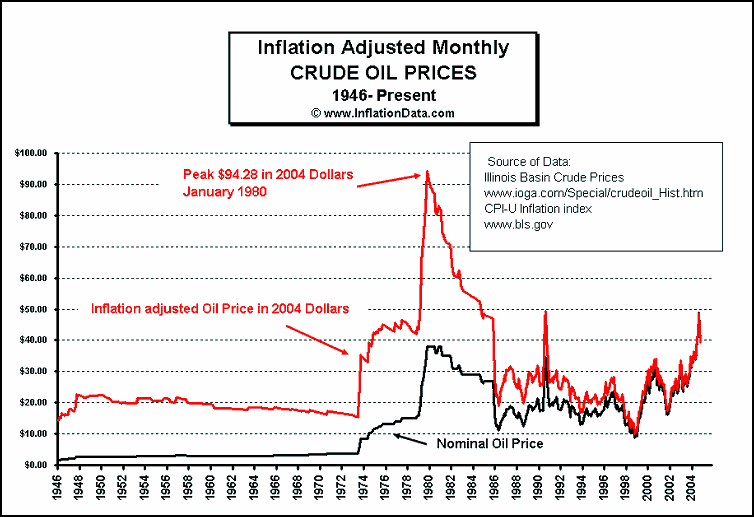Tuesday, January 22, 2008
It is not 1978
Flanker:Anybody that knows any RATIONAL member of the opposition has heard this line before regarding economic growth: "We all went through this before, in the 70's blah blah blah." Indeed during the late 70's Venezuela expirienced a modest boom in real economic growth and gargantuan in terms of nominal growth, the latter led people to naively believe that development status was assured, but the real numbers were creepy, and anybody that should have been paying attention did not.

Notice how this graph behaves exactly proportional to this one

Evidently the graph would be similar to what happens nowadays, nominal growth is growing at a 30 percent clip, and if this were the only data we could use to compare, the critics would have a point. (that up to this day growth is entirely similar to the 1970's) But here is where their theory falls flat.

It is not a joke, the year inflated adjusted oil prices were at their highest peak EVER (1980) and our country was in a STRONG RECESSION!!! Not to mention that the weakness was already there in 78-79 with pathetically anemic growth.
The boom that never really was. Barring 4-5 good years of 6% growth the rest was an illusion propped up by viewing things in a capitalistic way. Instead of looking at production we viewed revenues and consumption.
Source: UN statistics division
Now ow will probably chip in and claim that pegging the dollar was the fault of the recession in the middle of an oil boom, and while indeed partially correct the currency was pegged to the dollar for over a decade (unchanged), leading to overvaluation, since there are no PPP data that goes back as far I will post data starting in 1980.
1980-2008(predicted)

Source: IMF
We can assume that the currency was 20-30% overvalued during the whole 70's, and evidently it was something that could have contributed to the unsustainability of the peg. but still, it was devalued, and during the whole 80's and 90's it was so devalued that it would make Argentina blush, but there was no recovery, growth was sporadic and barely kept up with population growth. Suffice to say it was no South Korea.
I do believe that the currency should be kept as undervalued as possible, but everything is part of a whole, having a currency policy that is neither weak or strong will not spell doom or success, the only thing guaranteed is an economic bust if the price of oil collapses, but wake me up if we enter into a recession with this index actually increasing into the stratosphere, only then will this be the 70's all over again.
|

Notice how this graph behaves exactly proportional to this one

Evidently the graph would be similar to what happens nowadays, nominal growth is growing at a 30 percent clip, and if this were the only data we could use to compare, the critics would have a point. (that up to this day growth is entirely similar to the 1970's) But here is where their theory falls flat.

It is not a joke, the year inflated adjusted oil prices were at their highest peak EVER (1980) and our country was in a STRONG RECESSION!!! Not to mention that the weakness was already there in 78-79 with pathetically anemic growth.
The boom that never really was. Barring 4-5 good years of 6% growth the rest was an illusion propped up by viewing things in a capitalistic way. Instead of looking at production we viewed revenues and consumption.
Source: UN statistics division
Now ow will probably chip in and claim that pegging the dollar was the fault of the recession in the middle of an oil boom, and while indeed partially correct the currency was pegged to the dollar for over a decade (unchanged), leading to overvaluation, since there are no PPP data that goes back as far I will post data starting in 1980.
1980-2008(predicted)

Source: IMF
We can assume that the currency was 20-30% overvalued during the whole 70's, and evidently it was something that could have contributed to the unsustainability of the peg. but still, it was devalued, and during the whole 80's and 90's it was so devalued that it would make Argentina blush, but there was no recovery, growth was sporadic and barely kept up with population growth. Suffice to say it was no South Korea.
I do believe that the currency should be kept as undervalued as possible, but everything is part of a whole, having a currency policy that is neither weak or strong will not spell doom or success, the only thing guaranteed is an economic bust if the price of oil collapses, but wake me up if we enter into a recession with this index actually increasing into the stratosphere, only then will this be the 70's all over again.
|
